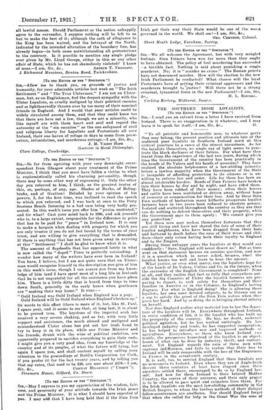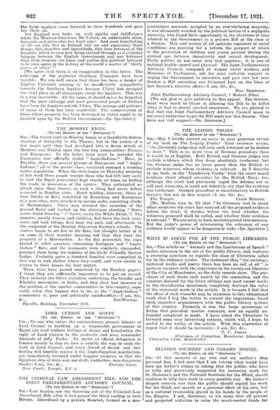THE SOUTHERN IRISH LOYALISTS. (To THE EDITOR or THE "
SPECTATOR.") SIR,—I send you an extract from a letter I have received from Ireland. There is no exaggeration in it whatever, and I may
leave it to speak for itself.—I am, Sir, &c., G.
"To all patriotic and honourable men, to whatever party they may belong, the present Position and ultimate fate of the scattered poor loyalists in Southern Ireland must at this critical juncture be a cause of the utmost uneasiness. As for the loyalists themselves, no single ray of light seems to pene- trate the black darkness of their future. For what have they learnt from the experience of the last two years, during which time the Government of the country has been practically in the hands of Pa Valera and his bands of assassins? They have realized the absolute helplessness of a law-abiding minority before a lawless majority when the Government of the State is incapable of affording protection to its citizens or is un- willing to enforce law and order. Life for them has been an almost intolerable burden. Bands of Sinn Feiners have broken into their houses by day and by night, and have rifled them. They have been robbed of their money; often their horses and cattle have been mutilated or driven away, without hope of recovery or compensation for their loss. And by these Sinn Fein methods of barbarism many hitherto prosperous loyalist farmers have in two years been reduced to absolute penury. Isolated and scattered throughout the country as they are they can do nothing to defend themselves and their property, while the Government says to them openly We cannot give you any protection.'
Yet these men may reckon themselves fortunate that they are still living and have not shared the fate of some of their loyalist neighbours, who have been dragged from their beds and battered to death before the eyes of their wives and chil- dren—their only crime having been their loyalty to England and to the Empire.
Daring these unhappy years the loyalists at first would say confidently; Sure, England will never desert us.' But as time went on that statement became an anxious question, and now it is a question which is never asked, because, alas! the loyalist knows too well and fears to hear the answer.
What justice, or even what mercy, can the loyalists hope for at the hands of De Valera. Collins and Co. in the future, when the surrender of the English Government is completed? None at all, and they realize that fact so fully that everywhere out- side the Six Counties of Ulster the loyalist farmers are pre- paring to depart, to seek safety for themselves and their families in America or in the Colonies, to England's lasting disgrace. For what is England doing? She is allowing there loyalists, her own most devoted subjects, to be thrown out as a sop to satisfy the greed of the Sinn fein wolves when they press her hard. And by so doing she is bringing eternal infamy on herself.
Nor does England realize what material loss to her the depar- ture of the loyalists will be. Everywhere throughout Ireland, in every condition of life, it is the loyalist who has built up the prosperity of the country. He has, no doubt, eschewed political agitation, but he has worked untiringly. Be lies developed industry and trade, he has supported co-operation, ho has helped to introduce new and improved methods of agriculture. Everywhere, as those who know Ireland can testify, the prosperous homestead of the loyalist is an object- lesson of what can be done by industry, thrift, and content- ment. Yet England regards the ruin of these men with supreme indifference, and fails to realize that their loss to Ireland will be only comparable with the loss of the Huguenots to France in the seventeenth century.
It is well, too, to remind England that these loyalists are no newcomers to Ireland. Even where they are of Anglo-Irish descent three centuries at least have elapsed since their ancestors settled there, encouraged to do so by England her- self. And now for them Ireland is their beloved Mother Country, the centre of their universe, and their only prayer is to be allowed to pass quiet and crimeless lives there. For the Irish loyalists are the most law-abiding community in the British Empire, to whom the lawless methods of their disloyal fellow-countrymen are anathema. Nor should England forget that when she called for help in the Great War the eons of
the Irish loyalists came forward in their hundreds and gave her their all.
Yet England now looks on with apathy and indifference while the Mexican-American, De Valera, an undesirable alien, torments and persecutes her loyal sons! And most humiliating of all—we who live in Ireland and see and experience these things, this injustice and ingratitude, this base betrayal of the loyalists, which is even now being carried through as a criminal bargain between the English - Government and our bitterest Sinn Fein enemies—we know and realize this political betrayal to be once again in the history of the world a matter of thirty pieces of silver.'" [We agree that there is no exaggeration in this letter. The sufferings of the scattered Southern' Unionists have been terrible. We are well aware that there has been a danger of English Unionists seeming to be insufficiently sympathetic towards the Southern loyalists because Ulster has occupied the chief place in all discussions about the loyalists. This was in a way inevitable. All the same, it should never he forgotten that the most unhappy and most persecuted people in Ireland have been the loyalists outside Ulster. The courage and patience of many of them has been wonderful. The compensation of those whose property has been destroyed or stolen ought to be insisted upon by the British Government.—En. Spectator.]







































 Previous page
Previous page